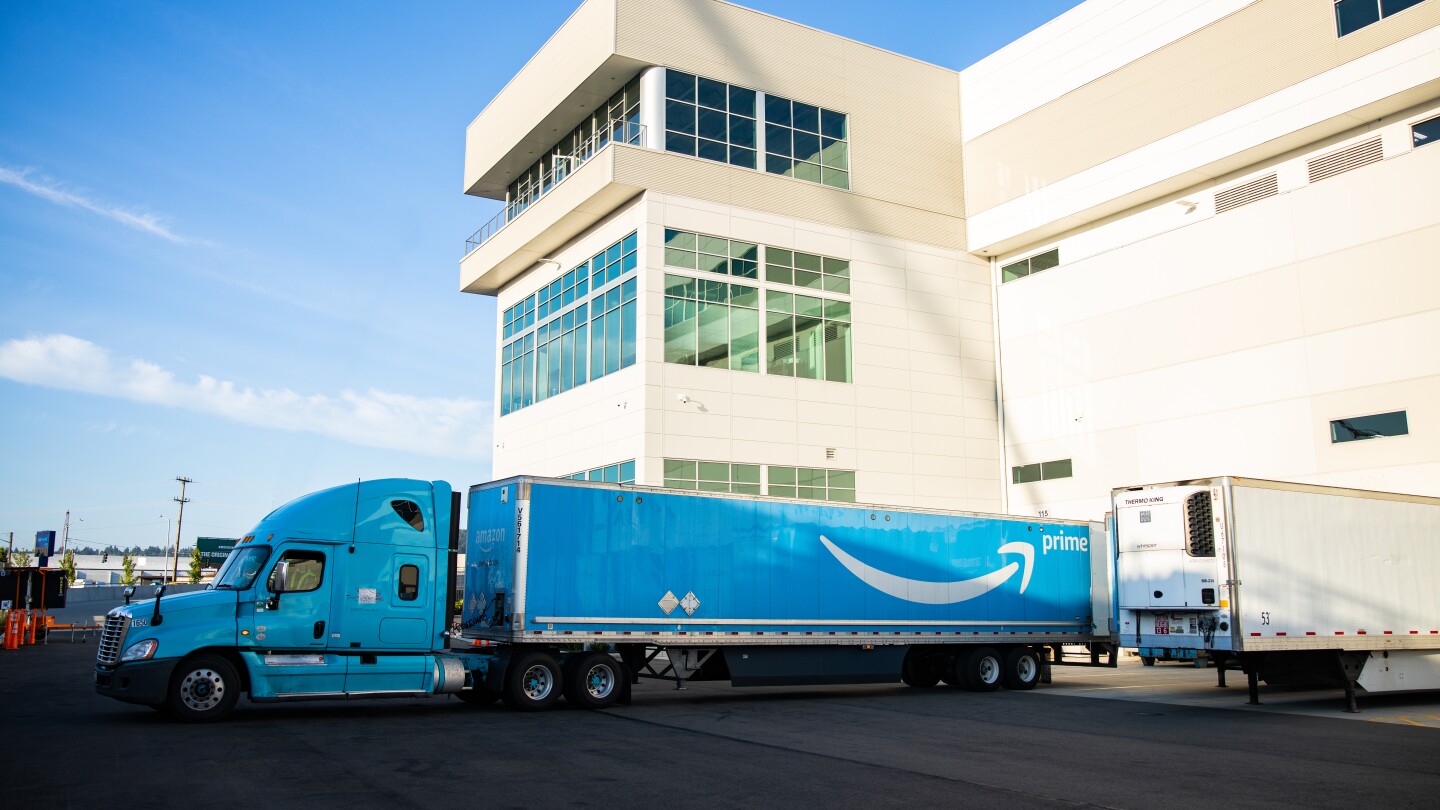Amazon Transportation Services’ Middle Mile team develops routing solutions to move customer orders from its vendors and fulfillment centers to its network of sortation centers, air facilities, and delivery stations in the most efficient way possible.
Over the past five years, the team has played a critical role in helping Amazon deliver on increasingly ambitious goals — from two-day and one-day deliveries for Prime customers, to one-hour delivery windows for services like Prime Now.
Recently, INFORMS, the leading international association for operations research and analytics professionals, recognized these achievements by awarding Amazon the 2021 INFORMS Prize. The award recognizes the effective integration of operations research and analytics into organizational decision making.

“Amazon has made longstanding contributions to operations research and analytics for decades, and their impact has been widely noted and recognized,” said Erica Klampfl, 2021 INFORMS Prize committee chair. “Amazon is truly deserving of this prestigious prize, and the entire O.R. and analytics community joins INFORMS in thanking them for all they have done and continue to do.”
Over the past five years, the team has doubled down on scientific innovation and operations research to move millions of packages globally through Amazon’s transportation network. The INFORMS award serves as a reminder not just of the work the Middle Mile team has done at Amazon, but also how far they have come.
An extremely complex problem
Given the high number of variables involved in arriving at optimal routing decisions, complexity is a constant for Amazon’s Middle Mile team.
For every customer order, Amazon’s routing algorithms must determine the best path through the network to move the product between suppliers, fulfillment centers, sorting facilities, and delivery stations, to quickly, safely, and cost-effectively reach customers.
They must evaluate the merits of each transportation option — surface, rail, air, or maritime — and determine the most effective route. The algorithms also determine an optimal or near-optimal route to send the order to a facility where it can be sorted and handed off for delivery. Finally, all schedules have to be designed in a way that optimizes for safety and complies with government regulations such as rest breaks, hours of service, and other requirements.
Our trucking network alone presents us with over ten octovigintillion possible routing solutions.
“To give you an idea of the scale and complexity we’re managing, our trucking network alone presents us with over 1088 — or ten octovigintillion — possible routing solutions,” says Tim Jacobs, director of Middle Mile Research Science and Optimization. “This is an especially large number, when you consider that there are 1082 atoms in the visible universe.”
And that’s just for the trucking network.
When a product is ordered on the Amazon Store, there are several ways it can make its way from a fulfillment center to the customer’s residence.
There’s the (relatively) straightforward approach: The product is sent from a fulfillment center to a sortation center and to a delivery station, at which point it is placed on a vehicle for delivery to the customer’s residence.
There are also more involved scenarios, such as when customers place time-sensitive orders for items stored in geographically distant fulfillment centers. In these cases, the products are often delivered using a combination of Amazon’s air cargo network along with the surface network to meet the customer’s delivery timelines.
When Jacobs joined Amazon in 2016, the majority of the company’s loads were carried by a relatively small number of large third-party carriers that managed the truck assignments and routings. Since then, the Middle Mile team has helped to develop new ways to manage its transportation network, including by routing a growing number of medium and small carriers using Amazon’s own technology and algorithms, enabling more efficient management and visibility of the transportation network, which in turn helps Amazon get packages to customers faster and more efficiently.
That effort began, in part, by expanding the team.
In the beginning: Improving Amazon’s surface operations
In 2016, Mauricio Resende was among just a few scientists in Amazon’s Middle Mile team — a number that has since grown significantly.
Prior to Amazon, Resende worked as a scientist at AT&T Labs focused on combinatorial optimization. At its essence, combinatorial optimization involves using mathematical methods to identify the best decisions for a problem from a large set of candidate solutions.
“In 2016, Amazon’s surface routing decisions were made using a basic local search algorithm,” Resende says. “Loads were allocated in advance. The process was largely iterative, and we drove small improvements to the algorithm week over week.”

Crucially, in order to automate routing decisions, the algorithms and systems needed to account for differing constraints and inputs that have a profound impact on routing decisions, such as the nuances of different regulatory agencies in each country.
The system also needed to understand the storage and throughput constraints of each facility by considering factors like operating hours or whether parking slips might be required. So, the team worked to model and eliminate those system blind spots.
“We developed more advanced data structures and algorithmic techniques to account for these constraints as we designed routing schedules,” says Resende.
Resende provides the example of a sequence evaluator designed by Amazon’s Middle Mile research team. The evaluator was designed to help find the most effective routing solution for a pre-determined objective function, such as cost, or number of trips with empty loads.
The evaluator computed the cost for a presented route. It kept working through possible changes to the route until a near-optimal route was found. This solution was then perturbed — routes were deliberately eliminated and new deliveries were fed into the algorithm. The task was then repeated. In this manner, the algorithm progressed toward an iteratively better solution.
Through methods such as these, Resende and his fellow researchers drove a significant reduction in surface transportation costs.
When you are working with such a large universe of possibilities, you have to be incredibly efficient in how you formulate the problem.
“When you are working with such a large universe of possibilities, you have to be incredibly efficient in how you formulate the problem,” says Resende. “You then have to be efficient in designing algorithms to solve that formulation of the problem.”
The Middle Mile team also faced situations where it had to route goods that hadn’t been accounted for in the demand forecasts that are an input to its routing plans. While future demand can be predicted, there are still many unknowns at the planning stage. A good example is spikes in demand for new products, or products that become unexpectedly popular.
To cope with demand variability, the Middle Mile team developed a truckload supply load board with dynamic pricing. The load board, powered by a number of machine learning algorithms coupled with mathematical optimization models, allowed Amazon to expand its delivery network by accessing the available capacity of pre-screened carriers operating in a geographical area or lane.
The load board dynamically sets prices for loads that are currently available. Carriers can review available loads simultaneously. Interested carriers can then accept the load at the offered price in real-time. This arrangement also helps carriers optimize the efficiency of their drivers’ schedules.
As Amazon drove improvements to its surface network, the Middle Mile team also leveraged scientific innovation to design routing solutions for its air cargo service, which has expanded rapidly since launching in 2016.
Developing algorithms to manage Amazon’s fleet of contracted airline partners
Nilay Noyan joined the company as a principal research scientist in September 2019. Prior to Amazon, Noyan was a professor of industrial engineering at Sabanci University in Istanbul.
Broadly speaking, the air routing problems are similar to those for surface networks. However, there are completely different constraints associated with airlines.
“Broadly speaking, the air routing problems are similar to those for surface networks,” says Noyan. “However, there are completely different constraints associated with airlines.”
These include regulatory constraints, lead times for procuring aircraft, the impact of fluctuating fuel prices, and resources required to manage airline contracts. Flight schedule designs also need to ensure that there is sufficient time for routine line maintenance, airplane refueling, and the loading and unloading of packages.
Arrival and departure times must be aligned with available capacity and resources to ensure packages are processed on time. To further complicate matters, airline schedules have to be aligned with those of the surface network so there are trucks waiting on the ground to carry packages to the next destination.
Over the past four years, the Middle Mile Planning Research and Optimization Science team has developed and implemented more than a dozen optimization and machine learning models to build and operate the air transport network. These tools help the team arrive at the most optimal decisions in areas such as flight schedule design, fuel management, package flow planning, maintenance planning, and disruption recovery.
Noyan says machine learning also plays an important role in helping the Middle Mile team solve for problems that are inherently stochastic or unpredictable in nature.

“Deviations from the execution plans are unavoidable in case of unexpected disruption events due to weather, unscheduled maintenance, and crew-related delays,” says Noyan. “Machine-learning-based prediction methods help us react to these unexpected situations, and adapt quickly so that we can meet our delivery promises to customers.”
In addition to helping Amazon adapt to unpredictable events, Jacobs sees machine learning playing an increasingly important role in helping Amazon more effectively unify the worlds of surface, air, rail and maritime networks for both network design and day of operations.
“At Amazon, we work back backwards from the customer,” he says. “We don’t think of each mode of transport separately, as is common in the industry. Instead, we are continually working to combine these areas effectively, so that the way we plan and the way we operate the network are consistent.”


















